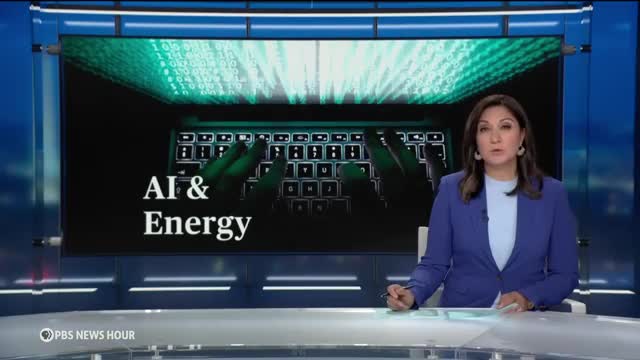AI's energy demands threaten climate goals warns experts

This article was created by AI summarizing key points discussed. AI makes mistakes, so for full details and context, please refer to the video of the full meeting. Please report any errors so we can fix them. Report an error »

Google has acknowledged a significant setback in its commitment to eliminate net carbon emissions by 2030, revealing that its emissions have surged nearly 50% since 2019. This increase has raised concerns among experts, particularly regarding the environmental impact of artificial intelligence (AI) and the energy demands of the company's extensive data centers.
As the AI sector expands, the energy consumption associated with powering these technologies has become a focal point of debate. Research professor Kate Crawford highlighted the potential climate consequences of building an infrastructure that is both energy and water-intensive. She noted that the increasing reliance on data centers, which are already under strain from the internet and cryptocurrency mining, could exacerbate issues like brownouts and extreme weather events.
Data centers, such as those operated by Equinix in Silicon Valley, are critical to AI operations, consuming vast amounts of energy—equivalent to the energy budget of a country like the Netherlands. With predictions that the energy usage of data centers could double in the next two years, the implications for global energy consumption are alarming.
Despite these challenges, there are signs of hope. Researchers are exploring smaller language models that require less data and energy, and regulatory attention is beginning to focus on AI's environmental impacts. Equinix is also investing in solar energy, which, while currently supplying only a small fraction of its power needs, could grow significantly in the future.
Tech entrepreneur Reid Hoffman expressed optimism that AI could ultimately help mitigate its own energy demands by optimizing data center operations. However, Crawford cautioned that without addressing the pressures on the electrical grid, costs could rise, complicating the balance between technological advancement and environmental sustainability.
As the conversation around AI and energy consumption continues, the need for innovative solutions and regulatory frameworks becomes increasingly urgent.
As the AI sector expands, the energy consumption associated with powering these technologies has become a focal point of debate. Research professor Kate Crawford highlighted the potential climate consequences of building an infrastructure that is both energy and water-intensive. She noted that the increasing reliance on data centers, which are already under strain from the internet and cryptocurrency mining, could exacerbate issues like brownouts and extreme weather events.
Data centers, such as those operated by Equinix in Silicon Valley, are critical to AI operations, consuming vast amounts of energy—equivalent to the energy budget of a country like the Netherlands. With predictions that the energy usage of data centers could double in the next two years, the implications for global energy consumption are alarming.
Despite these challenges, there are signs of hope. Researchers are exploring smaller language models that require less data and energy, and regulatory attention is beginning to focus on AI's environmental impacts. Equinix is also investing in solar energy, which, while currently supplying only a small fraction of its power needs, could grow significantly in the future.
Tech entrepreneur Reid Hoffman expressed optimism that AI could ultimately help mitigate its own energy demands by optimizing data center operations. However, Crawford cautioned that without addressing the pressures on the electrical grid, costs could rise, complicating the balance between technological advancement and environmental sustainability.
As the conversation around AI and energy consumption continues, the need for innovative solutions and regulatory frameworks becomes increasingly urgent.
View full meeting
This article is based on a recent meeting—watch the full video and explore the complete transcript for deeper insights into the discussion.
View full meeting